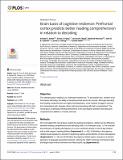Brain basis of cognitive resilience: Prefrontal cortex predicts better reading comprehension in relation to decoding
Author(s)
Patael, Smadar Z.; Farris, Emily A.; Black, Jessica M.; Hancock, Roeland; Gabrieli, John D. E.; Cutting, Laurie E.; Hoeft, Fumiko; ... Show more Show less
DownloadPublished version (3.733Mb)
Terms of use
Metadata
Show full item recordAbstract
This is an open access article distributed under the terms of the Creative Commons Attribution License, which permits unrestricted use, distribution, and reproduction in any medium, provided the original author and source are credited. Objective The ultimate goal of reading is to understand written text. To accomplish this, children must first master decoding, the ability to translate printed words into sounds. Although decoding and reading comprehension are highly interdependent, some children struggle to decode but comprehend well, whereas others with good decoding skills fail to comprehend. The neural basis underlying individual differences in this discrepancy between decoding and comprehension abilities is virtually unknown. Methods We investigated the neural basis underlying reading discrepancy, defined as the difference between reading comprehension and decoding skills, in a three-part study: 1) The neuroanatomical basis of reading discrepancy in a cross-sectional sample of school-age children with a wide range of reading abilities (Experiment-1; n = 55); 2) Whether a discrepancy-related neural signature is present in beginning readers and predictive of future discrepancy (Experiment-2; n = 43); and 3) Whether discrepancy-related regions are part of a domain-general or a language specialized network, utilizing the 1000 Functional Connectome data and large-scale reverse inference from Neurosynth.org (Experiment-3). Results Results converged onto the left dorsolateral prefrontal cortex (DLPFC), as related to having discrepantly higher reading comprehension relative to decoding ability. Increased gray matter volume (GMV) was associated with greater discrepancy (Experiment-1). Region-of-interest (ROI) analyses based on the left DLPFC cluster identified in Experiment-1 revealed that regional GMV within this ROI in beginning readers predicted discrepancy three years later (Experiment-2). This region was associated with the fronto-parietal network that is considered fundamental for working memory and cognitive control (Experiment-3). Interpretation Processes related to the prefrontal cortex might be linked to reading discrepancy. The findings may be important for understanding cognitive resilience, which we operationalize as those individuals with greater higher-order reading skills such as reading comprehension compared to lower-order reading skills such as decoding skills. Our study provides insights into reading development, existing theories of reading, and cognitive processes that are potentially significant to a wide range of reading disorders.
Date issued
2018-06Department
Massachusetts Institute of Technology. Department of Brain and Cognitive Sciences; McGovern Institute for Brain Research at MIT; Massachusetts Institute of Technology. Institute for Medical Engineering & ScienceJournal
PLoS One
Publisher
Public Library of Science (PLoS)
Citation
Patael, Smadar Z. et al. "Brain basis of cognitive resilience: Prefrontal cortex predicts better reading comprehension in relation to decoding." PLoS One 13, 6 (June 2018): e0198791 ©2018 The Authors
Version: Final published version
ISSN
1932-6203